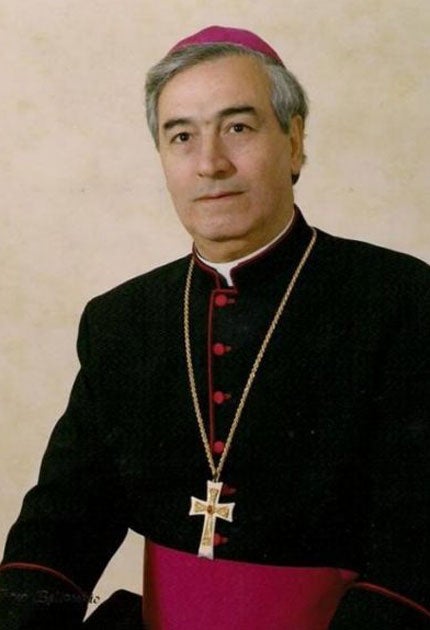Bishop Andraos Abouna: Priest who worked with Iraqi Catholics in London and war-torn Baghdad

Your support helps us to tell the story
From reproductive rights to climate change to Big Tech, The Independent is on the ground when the story is developing. Whether it's investigating the financials of Elon Musk's pro-Trump PAC or producing our latest documentary, 'The A Word', which shines a light on the American women fighting for reproductive rights, we know how important it is to parse out the facts from the messaging.
At such a critical moment in US history, we need reporters on the ground. Your donation allows us to keep sending journalists to speak to both sides of the story.
The Independent is trusted by Americans across the entire political spectrum. And unlike many other quality news outlets, we choose not to lock Americans out of our reporting and analysis with paywalls. We believe quality journalism should be available to everyone, paid for by those who can afford it.
Your support makes all the difference.Bishop Andraos Abouna spent his lifetime working in the church, as priest for Chaldean Catholics both in London and in his native Iraq, where he served his flock throughout times of war and periods of ferocious sectarian attack. In 2002 he became the Auxiliary Bishop of Baghdad in the Chaldean Church – an offshoot of the Assyrian Church of the East – which accepted the authority of the Pope in the 16th century.
Andraos Abouna was born in march 1943 in the village of Bedare, on the outskirts of the northern Iraqi town of Zakho into a disciplined Christian family. One of four brothers and four sisters, he was headed towards the priesthood from an early age. At the age of 14 he left his village and headed for Mosul, where he enrolled at the seminary of St Peter, and was ordained a priest in 1966.
A year later he was appointed parish priest for the diocese of Basra in southern Iraq. At this time Iraq was undergoing severe political turmoil; resentment towards Christians was growing amid the rise of nationalistic fervour, further compounded in 1967 after the Six Day war with Israel which resulted in the crushing defeat of the Arab armies. Throughout, Abouna was instrumental in initiating dialogue between Christians and Muslims.
In 1971 he was appointed parish priest of St Joseph Church in Baghdad, where he was to serve for 20 years, also teaching religious studies at the Rahibaat Al Taqaduma girls' school, run by French Catholic nuns. His talents were noticed by the Chaldean Patriarch, the late Raphael Bidawid, and he selected him as his personal secretary and assistant in 1989.
Throughout the 1980s the Iraqi-Catholic community in the UK was growing, mainly because of the Iran-Iraq war, but without a priest and a parish the community was scattered and diffuse. Against this backdrop, Father Abouna was appointed parish priest for the Chaldean and Syriac Catholic mission in England in 1991, a position he accepted with some alacrity. He held mass at St Anne's RC church in London (Laxton Place), and revived several parish activities such as newsletters and family gatherings.
During this period, Iraq was emerging from the Iran-Iraq war and first Gulf War, but the United Nations imposed economic and financial sanctions which lasted 13 years. Abouna felt the pain and the unmerited ordeals of the Iraqi people, both Christian and Muslims, and was committed to the lifting of sanctions.
In November 2002 he was elevated to the position of Auxiliary Bishopof Baghdad and personal secretary to the current head of the Chaldean Church, Patriarch Emmanuel III Delly. In January 2003, the feast of the Epiphany, he was consecrated by the late Pope John Paul II with 11 other new bishops. Shortly afterwards, he returned to Baghdad to help shepherd a community of some 700,000 Iraqi Chaldean Catholics.
Within weeks of Abouna's taking office, the allied invasion of Iraq commenced and Saddam Hussein was removed from power. Since the invasion, waves of cross-sect terror, with the Sunni and Shia groups racing to exterminate each other, have been ignited. These groups also viewed the American-led invasion as a Christian crusade and Iraqi Christians as its supporters and collaborators.
As Iraq continued to lose all semblance of peace and order, the persecution of Christians gained in ferocity. Abouna worked assiduously to help his people to deal with bomb attacks on churches, kidnappings and indiscriminate killing. The mass exodus of Christians from Baghdad created severe shortages in priests and deacons, but Abouna stayed defiantly in Baghdad and conducted regular mass at the church of Our Lady of Assumption in the Al Mansour district of Baghdad.
The bishop's health started deteriorating in 2008 as a result of kidney complications. He underwent intensive treatment in London and Baghdad. Despite his ill health he took charge of the Catholic youth pastoral care, holding events and talks when the security situation permitted.
In May 2010, he underwent kidney surgery and seemed to have recovered. He was looking forward to meeting the Pope in Rome this month, but he had a relapse and was admitted to hospital, where he died.
Andraos Abouna, priest: born Bedar, Zakho, Iraq 23 March 1943; ordained priest 1966; Auxiliary Bishop of Baghdad 2002; died Erbil, Iraq 27 July 2010.
Join our commenting forum
Join thought-provoking conversations, follow other Independent readers and see their replies
Comments